(ウェブ版の自己点検シート)
On scheme of National-guarantee of the "Responsible Conduct of Research, RCR," by CITI-Japan
On scheme of National-guarantee of the "Responsible Conduct of Research, RCR," by CITI-Japan
| APRIN-CITI-JAPANにアクセスしてください(ログインID/パスワー
ドが必要です) https://edu.aprin.or.jp/ ***旧年度の情報は〈Research_Ethics_2017CSCD.html〉 にアクセスしてください |
その他の情報
| 研究活動の公正性の確保及び適正な研究費の使用について確認・誓約すべ
き事項(日本学術振興会の研究者用HPより)※利用者は必ず最新版をチェックしてくださ
い!この画面はあくまでも参照です! |
Points for Verification and
Pledge Regarding the Maintenance of Propriety in Research Activities
and Appropriate Use of Research Grants |
| 【Japanese】 □科研費で研究活動を行うに当たっては、 科研費が国民の貴重な税金で賄われていることを十分認識し、科研費を適正かつ効率的に使用するとともに、研究において不正行為を行わないことが求められて います。 ついては、下記の内容を十分に確認し、遵守する場合には確認した事項にチェックを入れてください。全ての事項にチェックを入れなければ、交付申請書・交 付請求書(支払請求書)の作成画面に進むことができません。 また、本内容は日本学術振興会ホームページ(URL:https://www.jsps.go.jp/j- grantsinaid/15_hand/index.html)にも掲載されています。研究代表者の責務として、本内容を研究分担者等にも必ず周知し、 研究活動の公正性の確保や適正な研究費の使用について理解してもらうよう努めてください。 |
【English】 □ When conducting research activities using KAKENHI, you (researchers) must clearly understand that your KAKENHI are funded with the tax of citizens, use your KAKENHI in a proper and efficient way, and refrain from committing research misconduct. Please carefully check through the following contents and check the box of each item (Point for Verification ) in case you will comply with it. You are not able to go to the screen and create formal application for grant deliverly form and grant request form unless you check all boxes of the items below. Principal Investigators have the responsibility to make sure that these instructions are convenyed to Co-Investigator(s) (Co-I(s)) so as to ensure their understanding regarding the maintenance of propriety in research activities and appropriate use of research grants. |
| (研究活動の公正性の確保) |
Maintenance of Propriety in
Research Activities |
| 【Japanese】 □ 科学研究における不正行為は、科学を冒涜し、人々の科学への信頼を揺るがし、科学の発展を妨げるものであって、本来あってはならないものである。また、未 来への先行投資として、国費による研究費支援が増加する中、国費の効果的活用の意味でも研究の公正性の確保がより一層求められる。 |
【English】 □ Research misconduct amount to desecration of science, undermine people's trust in science, impede the development of science, and should not be allowed to happen in the first place. Also, as support through research grants from public funds is increasing for an advance investment for the future, even a higher expectation exisits for the maintenance of research propriety in the sense of effective use of public funds. |
| 【Japanese】 □ 研究活動とは、先人達が行った研究の諸業績を踏まえた上で、観察や実験等による事実、データを素材としつつ、自分自身の省察・発想・アイディア等に基づく 新たな知見を創造し、知の体系を構築していく行為である。研究成果の発表とは、研究活動によって得られた成果を、客観的で検証可能なデータ・資料を提示し つつ、研究者コミュニティに向かって公開し、その内容について吟味・批判を受けることである。不正行為とは、研究者倫理に背馳し、研究活動や研究成果の発 表の本質ないし本来の趣旨を歪め、研究者コミュニティの正常な科学的コミュニケーションを妨げる行為に他ならない。 |
【English】 □ Research activities are the acts of creating new knowledge and developing a knowledge system based on original reflections, inspirations, ideas, etc., while making use of facts and data obtained from observation, experimentation, etc., and extending the research achievements of our predecessors. The publication of research results consists of making the results open and available to the researchers' community for comments and criticisms through the presentation of objective and verifiable data and materials. Research misconduct are the acts in violation of research ethics, which distort the essence and/or the significance of the research activities and presented results, and which impede normal scientific communication of the researchers' community. |
| 【Japanese】 □ 不正行為は、科学そのものに対する背信行為であり、研究費の多寡や出所の如何を問わず絶対に許されない。これらのことを個々の研究者はもとより、研究者コ ミュニティや研究機関、研究費の配分機関は理解して、不正行為に対して厳しい姿勢で臨まなければならない。また、不正行為の問題は、知の生産活動である研 究活動における「知の品質管理」の問題として捉えることができる。公表した研究成果に不正行為が関わっていたことに気づいたら、直ちに研究者コミュニティ に公表し、取り下げることが必要である。 |
【English】 □ Research misconduct are acts of betrayal of science, and will absolutely not be tolerated, irrespective of the size or provenance of the research grant. This must be understood by individual researchers as well as researchers' communities, research institutions, institutions allocating research grants, all of whom must adopt an attitude of zero-tolerance against research misconduct. One may see the problem of research misconduct as the problem of "quality control of knowledge" which is the product of research activities. If research misconduct were to be found in their own published research results, researchers must immediately notify them to the researchers' community and withdraw the relevant results. |
| 【Japanese】 □ 不正行為に対する対応は、その防止とあわせ、まずは研究者自らの規律、ならびに研究者コミュニティ、研究機関の自律に基づく自浄作用としてなされなければ ならず、あらゆるレベルにおいて重要な課題として認識されなければならない。その際、若い研究者を育てる指導者自身が、自律・自己規律ということを理解 し、若手研究者や学生にきちんと教育していくことが重要である。 |
【English】 □ Research misconduct, along with its prevention, must be addressed, first of all, as a practice of self-correction based on researchers' own strict self-discipline and self-regulatory efforts in researchers' communities and research institutions, and it is thus to be acknowledged as an important task at all levels. Senior researchers who are in the position of training younger researchers must understand what self-discipline and autonomy entail, and that they must properly educate these junior researchers and students. |
| 【Japanese】 □ 「研究活動における不正行為への対応等に関するガイドライン」(平成26年8月26日 文部科学大臣決定)では以下の行為を特定不正行為としている。 (1) 捏 造: 存在しないデータ、研究結果等を作成すること。 (2) 改ざん: 研究資料・機器・過程を変更する操作を行い、データ、研究活動によって得られた結果等を真正でないものに加工すること。 (3) 盗 用: 他の研究者のアイディア、分析・解析方法、データ、研究結果、論文又は用語を、当該研究者の了解もしくは適切な表示なく流用すること。 |
【English】 □ In the "Guidelines for Responding to Misconduct in Research (Adopted August 26,2014 by the Minister of Education, Culture, Sports, Science and Technology)", each of the following acts is defined as a specific research misconduct. (1) Fabrication: Making up data or research results, etc. (2) Falsification: Manipulating research materials, equipment, or processes to change data or results obtained from research activities. (3) Plagiarism: Appropriating the ideas, analysis, analytical methods, data, research results, research paper(s), or words of other researchers without obtaining the permission of the researchers or giving appropriate credit. |
| (適正な研究費の使用) |
Appropriate Use of Research
Grants |
| 【Japanese】 □ 競争的資金等には研究機関に交付されるものと個々の研究者の研究遂行のためのものがあるが、個人への補助の性格を有するものであっても、その原資が国民の 税金である以上、国民の信頼に応えるため、競争的資金等の管理は研究機関の責任において行われている。 【English】 |
□Fundings,
competitive or
otherwise, consist of those that are provided to research institutions
and those that are for the implementation of research conducted by
individual researchers. However, even if the funding may appear to be
characterized as a subsidy to an individual researcher, the funding
must be managed under the responsibility of research institutions, in
order to ensure the trust of the citizens given that the funding
originates from their tax. |
| 【Japanese】 □ 競争的資金等の管理を委ねられた研究機関の責任者は、研究費の不正な使用が行われる可能性が常にあるという前提の下で、不正を誘発する要因を除去し、抑止 機能のあるような環境・体制の構築を図ることが求められている。 |
【English】 □ The person who is in charge of the management of the competitive funding and other funding in the research institutions is required to eliminate those factors that would induce improper grant spending and to cultivate an environment/system which functions to deter research misconduct, under the assumption that it is at all times possible that improper grant spending is committed. |
| 【Japanese】 □ 研究費の使用に当たっては、その管理が委ねられている研究機関のルールに従って適正に執行する必要がある。 |
【English】 □ When using research grants, it is necessary to appropriately implement research grants, in accordance to the rules of the research institution to which the management is entrusted. |
| 【Japanese】 □ 研究費の不正使用とは、故意若しくは重大な過失による研究費の他の用途への使用又は交付の決定の内容若しくはこれに付した条件に違反した使用をいう。 |
【English】 I□mproper grant spending is the use of the research grant for ulterior purposes, intentionally or by gross negligence, and/or the use that violates the content of, and/or the conditions attached to, the official grant decision. |
| 【Japanese】 □ 研究費の不正使用の事例は、虚偽の請求によって資金を引き出して、他の目的に流用したり、プールしたりすることなどであり、物品購入費、謝金・給与、旅費 に関するものに大別される。その際、私的流用はもとより、目的外の使用や書類の捏造による支出は、研究資金として使用された場合でも不正使用となる。 (1) 物品購入費に係る不正使用の例 業者と物品購入に係る架空の取引により、納品書や請求書等を捏造、改ざんすることなどによって、研究機関から支払われた代金を業者に「預け金」として管理 させ、適宜異なる研究用物品の納品を受けていた。 (2) 謝金・給与に係る不正使用の例 出勤表等を捏造、改ざんすることなどによって、謝金の水増しや架空の雇用者の給与の請求を行い、研究機関から支払われた謝金、給与を研究者に還流させ、研 究室等でプールし、適宜研究のための消耗品等の購入や大学院生等の学会等への旅費に使用するなどしていた。 (3) 旅費に係る不正使用の例 旅費の支払いに係る書類を捏造、改ざんすることによって日程の水増しや架空の出張に係る旅費の請求を行い、研究機関から支払われた旅費を研究者に還流さ せ、研究室等でプールし、適宜研究のための消耗品等の購入や大学院生等の学会等への旅費に使用していた。 |
【English】 □ Examples of improper grant spending include the act of taking out funding through a false invoice, that of misappropriating the funding for other purposes, and that of pooling the funding. They are broadly divided into improper grant spending related to (1) expenses for purchase of goods, (2) honoraria and salaries, and (3) travel expenses. In addition to the misappropriation for personal gains, the use of the funding for purposes other than the original intent and the expenditure through fabricated documents are considered improper grant spending, even if the research grant is used to fund the research. (1) Example of improper grant spending related to expenses for purchase of goods A researcher and a trader engage in a fictitious transaction of purchase of goods, whereby the researcher has the money paid by his/her research institution through fabricated or falsified statements of delivery and invoices to a fraudulent account managed by the trader, so that the researcher could receive the delivery of goods related to his/her research or otherwise inappropriately at his/her discretion. (2) Example of improper grant spending related to honoraria and salaries By fabricating or falsifying work attendance sheets or through other means, a researcher pads the bill for personnel or bills the salary of fictitious employees, so that the personnel costs and salaries paid by the research institution would return to him/herself, which then could be pooled for his/her laboratory or other use. The researcher then uses the pooled fund for the purchase of consumables or other items for his/her research, or for travel expenses of graduate students to attend conferences, inappropriately at his/her discretion. (3) Example of improper grant spending related to travel expenses By fabricating or falsifying documents related to the payment of travel expenses, a researcher inflates a schedule or bills travel expenses related to fictitious business trips so that the travel expenses paid by the research institution would return to hims/herself, which then could be pooled for his/her laboratory or other use. The researcher then uses the pooled fund for the purchase of consumables or other items for his/her research, or for travel expenses of graduate students to attend conferences, inappropriately at his/her discretion. |
| (不正が認定されたときの扱い) |
Responding to Fraud That Has
Been Established |
| 【Japanese】 □ 論文等において不正行為が行われたと認定された場合や研究費の不正使用が認定された場合は、競争的資金等の返還に加えて、認定された年度の翌年度から最長 10年間、競争的資金等への申請等の資格が制限される。 (注)研究費の不正使用が認定された場合の措置の見直しがなされました。(平成25(2013)年度4月より) |
【English】 □ If a research misconduct in research papers or other publications has been established, or if a improper grant spending has been established, the researcher will return the funding and, moreover, he/she will be excluded from eligibility to apply for competitive funding and other matters for a period up to 10 years, starting from the next fiscal year following the fiscal year in which the research misconduct(s) has/have been established. (Note) Measures to be taken for an established improper grant spending have been revised (since April 2013). |
| 【Japanese】 □ 捏造、改ざん、盗用の不正行為が認定されたときの措置の対象者は以下の者が該当する。 (1) 不正行為に関与したと認定された者(2~10年) (2) 不正行為に関与したとまでは認定されないものの、不正行為があったと認定された研究に係る論文等の内容について責任を負う者として認定された著者(1~3 年) |
【English】 □ When research misconduct, such as fabrication, falsification, or plagiarism, has been established, the following persons shall be subject to measures. (1) Persons established to have been involved in research misconduct (2 to 10 years exclusion from eligibility to apply). (2) Authors established that they bear responsibility for the content of a research paper or other research related publication for which it has been established that research misconduct have been committed, even if it has not been established that these authors themselves were involved in the research misconduct (1 to 3 years exclusion from eligibility to apply). |
| 【Japanese】 □ 研究費の不正使用が認定されたときの措置の対象者は以下の者が該当する。 (1) 不正使用を行った研究者及びそれに共謀した研究者(1~10年) (2) 偽りその他不正の手段により研究費の交付を受けていた研究者及びそれに共謀した研究者(5年) (3) 不正使用に直接関与していないが、善良なる管理者の注意をもって事業を行うべき義務に違反した研究者(1~2年) |
【English】 □ When improper grant spending has been established, the following persons shall be subject to measures. (1) Researchers who committed improper grant spending, and researchers who conspired in such use (1 to 10 years exclusion from eligibility to apply). (2) Researchers who received a research grant through deception or other fraudulent means, and researchers who conspired in such deception (5 years exclusion from eligibility to apply). (3) Researchers who violated their duty to proceed their projects with the due care of a diligent manager, even if they are not directly involved in improper grant spending (1 to 2 years exclusion from eligibility to apply). |
| 【Japanese】 □ 日本学術振興会及び文部科学省のみならず、他府省の所管の競争的資金を活用した研究活動において不正行為や不正使用があったと認定された者について、当該 認定に伴う申請等資格制限が一斉適用される。 |
【English】 □ Restrictions on eligibility to apply and other matters that are associated with the establishment of the said research misconduct or improper grant spending will apply uniformly to those for whom it has been established that they committed research misconduct or improper grant spending in research activities, regardless of whether the fundings were based on competitive funding from JSPS or the Ministry of Education, Culture, Sports, Science and Technology (MEXT) , or were under the control of other Government Offices and Ministries. |
| (研究倫理教育の受講等について) |
Completion of Research Ethics
Education Coursework, etc. |
| 本項目は課題毎の交付申請書又は支払請求書作成時に確認します。 |
You will confirm these items by
each of your research project when you prepare the form of the formal
application for grant delivery or the form of the request for grant
delivery. |
| 【Japanese】 □科研費の配分により行われる研究活動に 参画する研究代表者、研究分担者は、自ら研究倫理教育に関する教材(『科学の健全な発展のために-誠実な科学者の 心得-』日本学術振興会「科学の健全な発展のために」編集委員会、研究倫理eラーニングコース(e-Learning Course on Research Ethics[eL CoRE])、APRIN eラーニングプログラム(eAPRIN)等)を通読・履修すること、又は、「研究活動における不正行為への対応等に関するガイドライン」(平成26年8月 26日 文部科学大臣決定)を踏まえ研究機関が実施する研究倫理教育を受講することが求められています。 以下に示す研究倫理教育の受講等を行った上で、チェックしてください。 |
【English】 □ Principal Investigators and Co-Investigators (Co-Is) who are conducting research activities granted by KAKENHI must read the teaching material concerning Ethics Education in Research ,such as“For the Sound Development of Science - The Attitude of a Conscientious Scientist -” (“For the Sound Development of Science” Editorial Committee on JSPS) , complete E-Learning Course on Research Ethics (eL CoRE), APRIN e-learning program (eAPRIN), etc. or attend the lecture program given by research institutions on Ethics Education in Research in accordance with the “Guidelines for Responding to Misconduct in Research” (Adopted August 26, 2014 by the Minister of Education, Culture, Sports, Science and Technology). Please read and confirm the following items on the Completion of Research Ethics Education Coursework, etc. and check the box for verification. |
| 【Japanese】 □ 所属する研究機関の取扱いに従い、研究倫理教育の受講等を行いました。 |
【English】 □ I attended the Research Ethics Education Coursework, etc. in the accordance with the handling by the research institution to which I belong. |
| ※研究組織に研究分担者がいる場合には、以下の内容を研究分担者に確認
した上でチェックしてください。 |
If your project members include
(a) Co-Investigator(s), please ask him/her/them about the following and
check the box. |
| 【Japanese】 □ 研究組織全ての研究分担者が、所属する研究機関の取扱いに従い、研究倫理教育の受講等を行いました。 |
【English】 □ All Co-Investigators of my project members attended the Research Ethics Education Coursework, etc. in accordance with the handling by the research institutions to which they belong. |
| ※研究組織に研究分担者がいない場合には、以下をチェックしてくださ
い。 |
If your project members do not
include (a) Co-Investigator(s), please check the box below. |
| 【Japanese】 研究分担者はいません。 |
【English】 My project members do not include (a) Co-Investigator(s). |
| (研究者が遵守すべき行動規範について) |
Code of Conduct for Scientists
to Adhere |
| 本項目は課題毎の交付申請書又は支払請求書作成時に確認します。 |
You will confirm these items by
each of your research project when you prepare the form of the formal
application for grant delivery or the form of the request for grant
delivery. |
| 【Japanese】 □ 研究者が研究遂行上配慮すべき、日本学術会議の声明「科学者の行動規範-改訂版-」(うち、Ⅰ.科学者の責務)や、日本学術振興会「科学の健全な発展のた めに-誠実な科学者の心得-」(特に、SectionⅠ 責任ある研究活動とは)について、十分内容を理解し確認しました。科研費による研究を遂行するに 当たっては、こうした行動規範を遵守し、公平で誠実な研究活動を行うことを約束します。 【日本学術会議 声明「科学者の行動規範-改訂版-」(平成25年(2013年)1月25日)より抜粋】 Ⅰ.科学者の責務 (科学者の基本的責任) 1 科学者は、自らが生み出す専門知識や技術の質を担保する責任を有し、さらに自らの専門知識、技術、経験を活かして、人類の健康と福祉、社会の安全と安寧、 そして地球環境の持続性に貢献するという責任を有する。 (科学者の姿勢) 2 科学者は、常に正直、誠実に判断、行動し、自らの専門知識・能力・技芸の維持向上に努め、科学研究によって生み出される知の正確さや正当性を科学的に示す 最善の努力を払う。 (社会の中の科学者) 3 科学者は、科学の自律性が社会からの信頼と負託の上に成り立つことを自覚し、科学・技術と社会・自然環境の関係を広い視野から理解し、適切に行動する。 (社会的期待に応える研究) 4 科学者は、社会が抱く真理の解明や様々な課題の達成へ向けた期待に応える責務を有する。研究環境の整備や研究の実施に供される研究資金の使用にあたって は、そうした広く社会的な期待が存在することを常に自覚する。 (説明と公開) 5 科学者は、自らが携わる研究の意義と役割を公開して積極的に説明し、その研究が人間、社会、環境に及ぼし得る影響や起こし得る変化を評価し、その結果を中 立性・客観性をもって公表すると共に、社会との建設的な対話を築くように努める。 (科学研究の利用の両義性) 6 科学者は、自らの研究の成果が、科学者自身の意図に反して、破壊的行為に悪用される可能性もあることを認識し、研究の実施、成果の公表にあたっては、社会 に許容される適切な手段と方法を選択する。 ※URL:http://www.scj.go.jp/ja/scj/kihan/ 【日本学術振興会「科学の健全な発展のために-誠実な科学者の心得-」】 (日本語版(テキスト版))(日本学術振興会「科学の健全な発展のために」編集委員会) ※URL:https://www.jsps.go.jp/j-kousei/data/rinri.pdf |
【English】 □I understand thoroughly and confirm both the statement "Code of Conduct for Scientists -Revised Version-" (section I. "Responsibilities of Scientists") by the Science Council of Japan and the booklet "For the Sound Development of Science - The Attitude of a Conscientious Scientist-" (especially section I "What Is a Responsible Research Activity?") issued by the JSPS for which the researchers should consider in conducting their research. Also, I pledge to adhere such code of conduct and carry out research activities fairly and conscientiously in conducting the research using the KAKENHI. [Extraction from the Statement "Code of Conduct for Scientists - Revised Version -" by the Science Council of Japan dated on 25 January 2013] I Responsibilities of Scientists (Basic Responsibilities of Scientists) 1 Scientists shall recognize that they are responsible for assuring the quality of the specialized knowledge and skills that they themselves create, and for using their expert knowledge, skills and experience to contribute to the health and welfare of humankind, the safety and security of society and the sustainability of the global environment. (Attitude of Scientists) 2 Scientists shall always make judgments and act with honesty and integrity, endeavoring to maintain and improve their own expertise, abilities and skills, and shall make the utmost effort to scientifically and objectively demonstrate the accuracy and validity of the knowledge they create through scientific research. (Scientists in Society) 3 Scientists shall recognize that scientific autonomy is upheld by public trust and the mandate of the people, understand the relationships between science, technology, society, and the natural environment from a wide-ranging perspective, and act in an appropriate manner. (Research that Answers to Social Wishes) 4 Scientists shall recognize that they are responsible for answering to the wishes of society to investigate into truths and to achieve various issues. When using research funds that are to be provided for establishing the research environment and for conducting research scientists shall always recognize that such broad social expectations exist. (Accountability and Disclosure) 5 Scientists shall strive to disclose and actively explain the roles and significance of their own research, evaluate the possible effects of their research on people, society and the environment as well as the changes that their research might engender, neutrally and objectively disclose the results of this evaluation, and build a constructive dialogue with society. (Dual Use of Scientific Research Outcomes) 6 Scientists shall recognize that there exist possibilities that their research results, contrary to their own intentions, may be used for destructive actions, and shall select appropriate means and methods as allowed by society in conducting research and publicizing the results. * URL:http://www.scj.go.jp/ja/scj/kihan/ ["For the Sound Development of Science - The Attitude of a Conscientious Scientist -" by the Japan Society for the Promotion of Science (JSPS)] (Japanese version (text version)) ("For the Sound Development of Science" Editorial Committee on JSPS) * URL:https://www.jsps.go.jp/j-kousei/data/rinri.pdf |
| ※研究組織に研究分担者がいる場合には、以下の内容を研究組織内の全て
の研究分担者に誓約させた上で、チェックしてください。 |
If your project members include
(a) Co-Investigator(s), please ask him/her/all of them to make a pledge
on the following statement and check the box. |
| 【Japanese】 □ 研究分担者として、上述の日本学術会議の声明「科学者の行動規範-改訂版-」や、日本学術振興会「科学の健全な発展のために-誠実な科学者の心得-」につ いて、十分内容を理解するとともに確認し、科研費による研究を遂行するに当たっては、こうした行動規範を遵守し、公平で誠実な研究活動を行うことを約束し ます。 |
【English】 □ He/she/they understand thoroughly and confirm both the above-mentioned statement "Code of Conduct for Scientists -Revised Version-" by the Science Council of Japan and the booklet "For the Sound Development of Science - The Attitude of a Conscientious Scientist-" issued by the JSPS as a Co-Investigator. Also, he/she/they pledge to adhere such code of conduct and carry out research activities fairly and conscientiously in conducting the research using the KAKENHI as a Co-Investigator. |
| ※研究組織に研究分担者がいない場合には、以下をチェックしてくださ
い。 |
If your project members do not
include (a) Co-Investigator(s), please check the box below. |
| 【Japanese】 研究分担者はいません。 |
【English】 My project members do not include (a) Co-Investigator(s). |
| (補助条件(交付条件)の遵守について) |
For Compliance of Supplementary
Conditions (Funding Conditions) |
| 本項目は課題毎の交付申請書又は支払請求書作成時に確認します。 |
You will confirm these items by
each of your research project when you prepare the form of the formal
application for grant delivery or the form of the request for grant
delivery. |
| 【Japanese】 □ 科研費により研究を遂行するに当たり、補助条件(交付条件)を理解しこれを遵守します。また、学術研究に対する国民の負託を受けていること、及び科研費が 国民の貴重な税金で賄われていることを十分認識し、科研費を適正かつ効率的に使用するとともに、研究において不正行為を行わないことを約束します。 |
【English】 □ When conducting research activities using KAKENHI, I understand and comply with the supplementary conditions (funding conditions). Also, I clearly recognize that citizens have placed trust in scientific research and that KAKENHI are funded with their tax, and I therefore use KAKENHI in a proper and efficient way and refrain from committing research misconduct during my research. |
| ※研究組織に研究分担者がいる場合には、以下の内容を研究組織内の全て
の研究分担者に誓約させた上で、チェックしてください。 |
If your project members include
(a) Co-Investigator(s), please ask him/her/all of them to make a pledge
on the following statement and check the box. |
| 【Japanese】 □ 研究分担者として、科研費により研究を遂行するに当たり、補助条件(交付条件)を理解しこれを遵守します。また、学術研究に対する国民の負託を受けている こと、及び科研費が国民の貴重な税金で賄われていることを十分認識し、科研費を適正かつ効率的に使用するとともに、研究において不正行為を行わないことを 約束します。 |
English】 □ When conducting research activities using KAKENHI, he/she/they understand and comply with the supplementary conditions (funding conditions) as a Co-Investigator. Also, he/she/they clearly recognize that citizens have placed trust in scientific research and that KAKENHI are funded with their tax, and he/she/they therefore use KAKENHI in a proper and efficient way and refrain from committing research misconduct during my research as a Co-Investigator. |
| ※研究組織に研究分担者がいない場合には、以下をチェックしてくださ
い。 【Japanese】 研究分担者はいません。 |
If your project members do not
include (a) Co-Investigator(s), please check the box below. 【English】 My project members do not include (a) Co-Investigator(s). |
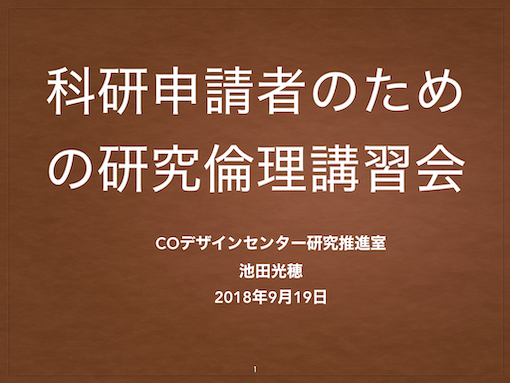 |
1 科研申請者のための研究倫理講習会【歴史的資料:だがそれなりに役立 つ】 COデザインセンター研究推進室 池田光穂 2018年9月19日 |
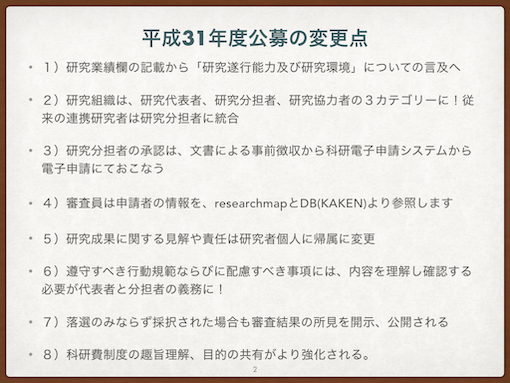 |
2 平成31年度公募の変更点 • 1)研究業績欄の記載から「研究遂行能力及び研究環境」についての言及へ • 2)研究組織は、研究代表者、研究分担者、研究協力者の3カテゴリーに!従来の連携研究者は研究分担者に統合 • 3)研究分担者の承認は、文書による事前徴収から科研電子申請システムから電子申請にておこなう • 4)審査員は申請者の情報を、researchmapとDB(KAKEN)より参照します • 5)研究成果に関する見解や責任は研究者個人に帰属に変更 • 6)遵守すべき行動規範ならびに配慮すべき事項には、内容を理解し確認する必要が代表者と分担者の義務に! • 7)落選のみならず採択された場合も審査結果の所見を開示、公開される • 8)科研費制度の趣旨理解、目的の共有がより強化される。 |
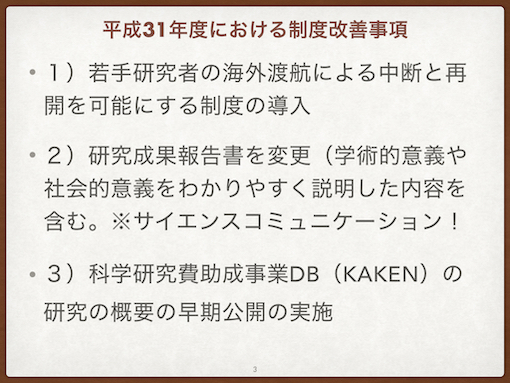 |
3 平成31年度における制度改善事項 • 1)若手研究者の海外渡航による中断と再開を可能にする制度の導入 • 2)研究成果報告書を変更(学術的意義や社会的意義をわかりやすく説明した内容を含む。※サイエンスコミュニケーション! • 3)科学研究費助成事業DB(KAKEN)の研究の概要の早期公開の実施 |
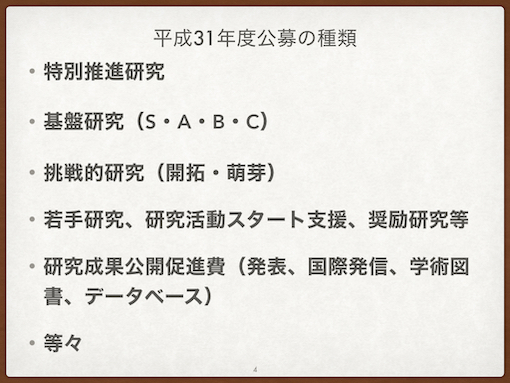 |
4 平成31年度公募の種類 • 特別推進研究 • 基盤研究(S・A・B・C) • 挑戦的研究(開拓・萌芽) • 若手研究、研究活動スタート支援、奨励研究等 • 研究成果公開促進費(発表、国際発信、学術図書、データベース) • 等々 |
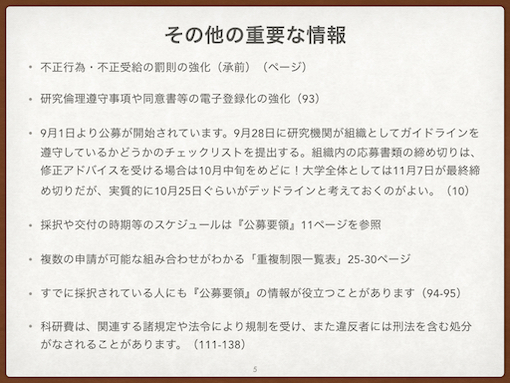 |
5 その他の重要な情報 • 不正行為・不正受給の罰則の強化(承前)(ページ) • 研究倫理遵守事項や同意書等の電子登録化の強化(93) • 9月1日より公募が開始されています。9月28日に研究機関が組織としてガイドラインを遵守しているかどうかのチェックリストを提出する。組織内の応募書 類の締め切りは、修正アドバイスを受ける場合は10月中旬をめどに!大学全体としては11月7日が最終締め切りだが、実質的に10月25日ぐらいがデッド ラインと考えておくのがよい。(10) • 採択や交付の時期等のスケジュールは『公募要領』11ページを参照 • 複数の申請が可能な組み合わせがわかる「重複制限一覧表」25-30ページ • すでに採択されている人にも『公募要領』の情報が役立つことがあります(94-95) • 科研費は、関連する諸規定や法令により規制を受け、また違反者には刑法を含む処分がなされることがあります。(111-138) |
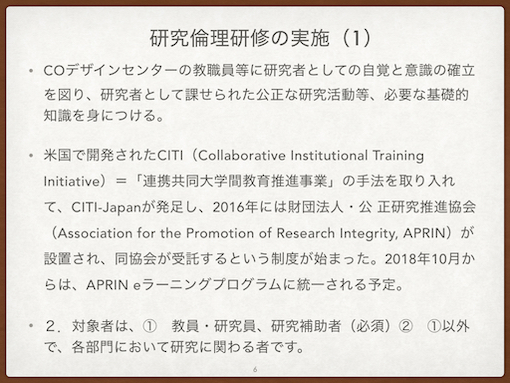 |
6 研究倫理研修の実施(1) • COデザインセンターの教職員等に研究者としての自覚と意識の確立を図り、研究者として課せられた公正な研究活動等、必要な基礎的知識を身につける。 • 米国で開発されたCITI(Collaborative Institutional Training Initiative)=「連携共同大学間教育推進事業」の手法を取り入れて、CITI-Japanが発足し、2016年には財団法人・公 正研究推進協会(Association for the Promotion of Research Integrity, APRIN)が設置され、同協会が受託するという制度が始まった。2018年10月からは、APRIN eラーニングプログラムに統一される予定。 • 2.対象者は、① 教員・研究員、研究補助者(必須)② ①以外で、各部門において研究に関わる者です。 |
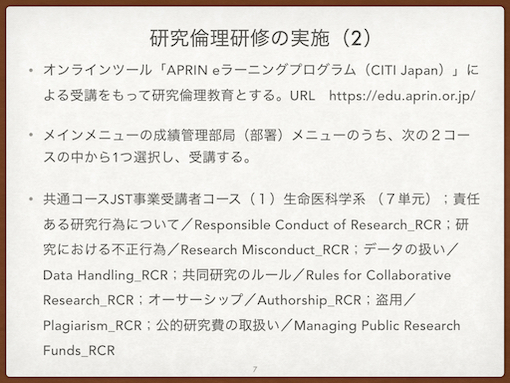 |
7 研究倫理研修の実施(2) • オンラインツール「APRIN eラーニングプログラム(CITI Japan)」による受講をもって研究倫理教育とする。URL https://edu.aprin.or.jp/ • メインメニューの成績管理部局(部署)メニューのうち、次の2コースの中から1つ選択し、受講する。 • 共通コースJST事業受講者コース(1)生命医科学系 (7単元);責任ある研究行為について/Responsible Conduct of Research_RCR;研究における不正行為/Research Misconduct_RCR;データの扱い/Data Handling_RCR;共同研究のルール/Rules for Collaborative Research_RCR;オーサーシップ/Authorship_RCR;盗用/Plagiarism_RCR;公的研究費の取扱い/Managing Public Research Funds_RCR |
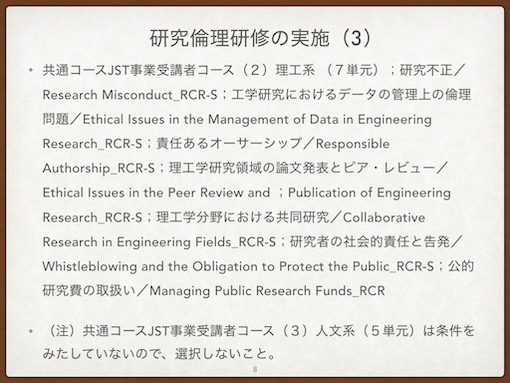 |
8 研究倫理研修の実施(3) • 共通コースJST事業受講者コース(2)理工系 (7単元);研究不正/Research Misconduct_RCR-S;工学研究におけるデータの管理上の倫理問題/Ethical Issues in the Management of Data in Engineering Research_RCR-S;責任あるオーサーシップ/Responsible Authorship_RCR-S;理工学研究領域の論文発表とピア・レビュー/Ethical Issues in the Peer Review and ;Publication of Engineering Research_RCR-S;理工学分野における共同研究/Collaborative Research in Engineering Fields_RCR-S;研究者の社会的責任と告発/Whistleblowing and the Obligation to Protect the Public_RCR-S;公的研究費の取扱い/Managing Public Research Funds_RCR • (注)共通コースJST事業受講者コース(3)人文系(5単元)は条件をみたしていないので、選択しないこと。 |
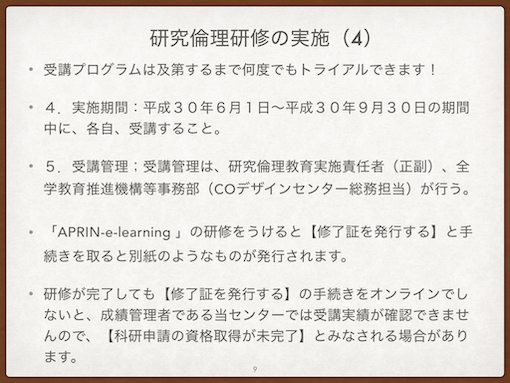 |
9 研究倫理研修の実施(4) • 受講プログラムは及第するまで何度でもトライアルできます! • 4.実施期間:平成30年6月1日~平成30年9月30日の期間中に、各自、受講すること。 • 5.受講管理;受講管理は、研究倫理教育実施責任者(正副)、全学教育推進機構等事務部(COデザインセンター総務担当)が行う。 • 「APRIN-e-learning 」の研修をうけると【修了証を発行する】と手続きを取ると別紙のようなものが発行されます。 • 研修が完了しても【修了証を発行する】の手続きをオンラインでしないと、成績管理者である当センターでは受講実績が確認できませんので、【科研申請の資格 取得が未完了】とみなされる場合があります。 |
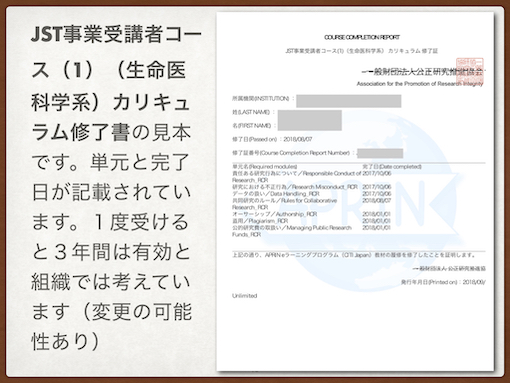 |
10 JST事業受講者コース(1)(生命医科学系)カリキュラム修了書の見本です。単元と完了日が記載されています。1度受けると3年間は有効と組織では考え ています(変更の可能性あり) |
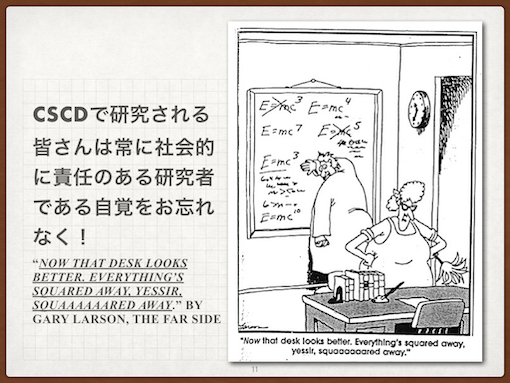 |
11 CSCDで研究される皆さんは常に社会的に責任のある研究者である自覚をお忘れなく! “Now that desk looks better. Everything’s squared away, yessir, squaaaaaared away.” by Gary Larson, The Far Side. |
科学技術政策のリードにおいては日本では、篤実な基礎研究を「研究のための研究」と非難し、とにかく耳障りのよいイノベーションや新規 性のある最先端研究がもてはやされ、かつ、本来の研究倫理を監視する 機能をもったピアレビューにも、研究公正の観点がなかなか導 入されることがなかった。 また、研究の現場では、重大な研究不正が横行する一方、 発覚した不正に対して大学・研究機関は厳正なる処罰をおこなわない伝統が続いているため。そのため 政府や政府系の学術会議は、もはや大学・研究機関あるいは学会の連合組織である学協会による倫理教育や研究公正に多くの信頼を置いているようには思えな い。あるいは、ピアによる研究倫理環境の改善や対応策に、統一観がないことに重大な危惧を抱いている。
また、公的資金により採択された研究課題に関しては、所属する部局が責任をもって構成する「施設審査委員会(IRB)」いわゆる倫理委員会に対して、研究倫理
申請をおこない、認可されてから、研究を正式にスタートさせるものだと考えられている。
****
米国で開発されたCITI(Collaborative Institutional Training Initiative)=「連携共同大学間教育推進事業」(この訳語は市川家國による)の手法を取り入れて、CITI-Japan というすでに先行しておこなわれていた、米国のe-learning(eラーニング)による大学教育の一般的手法導入を取り入れ「教育の質」の保障をおこ なう動きがあったが、そのうちの研究倫理/研究公正の研修をe-learning(eラーニング)の形で、2016(平成28)年2月には、財団法人・公 正研究推進協会(Association for the Promotion of Research Integrity, APRIN)(会長:吉川弘之)が設置され、同協会が受託するという制度が始まった。
現在では、日本学術振興会が公募する科学研究費補助金の応募、さらには日本科学技術振興機構が提供するさまざまな研究開発資金等、政府系の研究
公募には、
CITI-Japanの提供科目のベーシック・コース (基本6単元コース)は以下にあるうち、◎がついているものである。ただし、JST事業受 講者(理系、医学、文系別)コースは、さらに◎がついていない、6単元コースを受講しないとならない。
CSCD では、平成30(2018)年度より、「JST事業受講者コース(1)(生命医科学系)」「JST事業受講者コース(2)(理工系)」「JST事業受講者 コース(3)(人文系)」のうち、申請区分の専門分野に応じて最低1つ以上の研修を履修することと変更しました。詳しい解説は「教職員のための研究倫理教育」を参照ください。
また、「APRIN-CITI-JAPAN」の研修をうける と【修了証を発行する】と手続きを取ると下記のようなものが発行されます。
■レクチャー
++++++++++++
ダウンロードリンク
リンク
文献
その他の情報
***
Copyleft, CC, Mitzub'ixi Quq Chi'j, 1997-2099
Do not paste, but
[Re]Think our message for all undergraduate
students!!!
Copyleft,
CC, Mitzub'ixi Quq Chi'j, 1996-2099